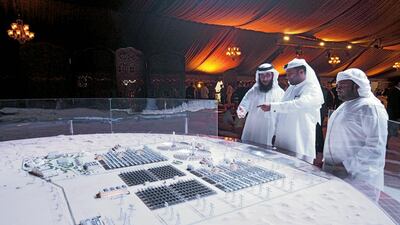The Saudi renewables major Acwa Power has snapped up a landmark solar contract in Dubai at record low prices.
The Dubai Electricity and Water Authority (Dewa) announced yesterday that the Acwa-led consortium, which includes Spain's TSK, won the tender to build and operate the second phase of Mohammed bin Rashid Al Maktoum solar park in Dubai.
Dewa increased the phase’s planned production capacity from 100 megawatts to 200MW after receiving the world’s lowest bids for solar photovoltaic (PV).
One megawatt is about the amount of power needed for 1,000 homes.
“Acwa has been awarded 550MW of solar projects since the beginning of the year,” said the Acwa chief executive, Paddy Padmanathan. “We currently have 710MW of renewable energy projects [in Mena] and plan 1,000MW in the Mena region by the end of the year.”
Acwa originally bid for the 100MW at an unprecedented and unsubsidised price of 5.98 US cents per kilowatt hour. The Saudi firm put in an additional alternative offer, hoping to grab the remainder of the 1,000MW solar park at a fixed tariff of 5.4 cents. The lowest prices in the PV market seen until now were in Brazil at 8 cents per kWh.
The alternative proposal accepted by Dewa for the expanded 200MW phase will bring tariffs down to 5.84 cents per kWh over a 25-year period. Dewa said it will work with the preferred bidder to reach a financial close in the next month.
“The number of bidders and the competitive price we received demonstrates the trust of international investors in Dubai and Dewa, and a testament to our transparency in all our projects in addition to Dewa’s strong financial position,” said the Dewa chief executive Saeed Mohammed Al Tayer.
Moody’s has upgraded Dewa to BAA2, while S& P has given it a BBB rating, according to the Dewa chief.
With its expanded size, the solar park is now one of the largest PV projects in the world.
Mr Padmanathan said that while Acwa submitted bids for the remaining megawatts of the solar park, the company did not expect Dewa to immediately award the entire project.
Acwa's bid represents the declining costs of solar PV technology, making it more cost-competitive with conventional energy such as natural gas. Given the falling trend for prices, Mr Padmanathan said, "I very well understand why Dewa wouldn't want to go forward [to award the remaining megawatts].
“It isn’t that the prices may come down further – pricing will come down,” he said. “I think, as we continue to deploy more, the market will continue to respond.”
Solar PV prices are 75 per cent lower than five years ago, according to the Middle East Solar Industry Association. Dewa launched the solar park two years ago as part of Dubai’s 2030 energy diversification goals aimed at bringing clean energy to the emirate’s total power generation to 5 per cent.
Mr Al Tayer said that Dubai was considering increasing that target. “I think this 5 per cent will move soon, but this will need to be studied carefully as it’s a strategy issue,” he said.
The first phase of 13MW was brought online in October by First Solar. The tender process for the second phase drew bids from 49 applicants with 24 of those shortlisted.
The winning consortium will use panels manufactured by the Arizona-based First Solar, which had made its own bid at 9 cents per kWh.
“I don’t think [First Solar] is able to optimise the operations and maintenance costs as much as we can,” said Mr Padmanathan, adding that Acwa employs about 1,000 people specialised in operations and maintenance. “We’ve put 17 to 18 plants in this region, and we’re able to deliver quite a lot of value in the supply chain.”
The second phase of the PV plant is to be operational by April 2017, reducing carbon emissions by 250,000 tonnes a year by 2020.
The target date for reaching full capacity of 1,000MW is 2030.
lgraves@thenational.ae
Follow The National's Business section on Twitter

